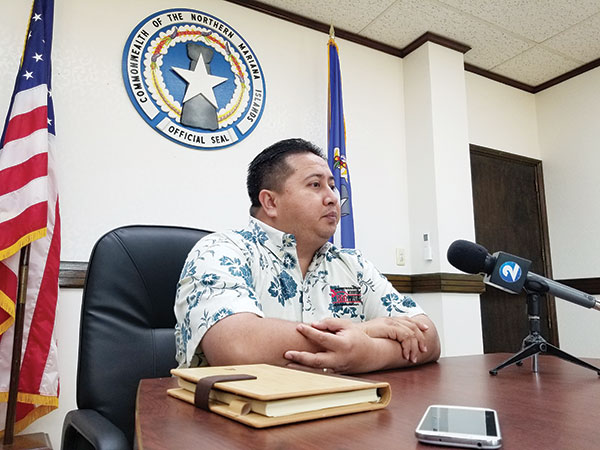‘Labor pains could stunt gains’

Gov. Ralph DLG Torres briefs reporters about his recent trip to Washington, D.C. in connection with a House Natural Resources hearing on House Resolution 560 and the H-2B issue on Filipino construction workers. (Jon Perez)
The CNMI’s current labor debacle will have an adverse effect on the Commonwealth’s economic development and could ultimately undo the significant gains achieved in the last six years after a roller-coaster ride of almost a decade. The CNMI’s gross domestic product for 2017 was at 25.1 percent, a large leap from a record-low -17.5 percent 10 years ago.
This could very well sum up Gov. Ralph DLG Torres’ message to federal officials during his recent trip to Washington, D.C., he said during a press briefing he gave yesterday to provide a status update on the results of his trip.
At the U.S. Congress, Torres gave testimony in two separate legislative hearings in the U.S. Senate and U.S. House of Representatives, and led the CNMI delegation in other meetings with federal officials to discuss issues surrounding the decision to rescind the CNMI’s parole program and the Philippines’ removal from the H-2B visa program.
One of the hearings was with the U.S. House of Representatives’ Natural Resources Committee called by Delegate Gregorio Kilili C. Sablan (Ind-MP) for his H.R. 560.
The U.S. Department of Homeland Security had removed the Philippines from the list of countries eligible for the H-2B visa, while U.S. Citizenship and Immigration Services discontinued the CNMI program.
Torres, in yesterday’s press conference, said other investors, aside from Imperial Pacific International (CNMI) LLC, could not get their respective projects started due to the lack of laborers in the CNMI. “IPI is still committed but they are one of the companies that are also hit [with parole and H-2B visa decisions].”
“Before, the construction workers were under the CW-1 [program], then they removed that and put them in H-2B [visas]. A year later they cut the Philippines [from H-2B]. My other concern are those companies that have already invested and want to build hotels and could not get off the ground. For IPI, it is one of those unfortunate situations for them.”
There are hotel development projects ongoing in San Antonio, Tanapag, and Capital Hill, to name a few, and Torres said these developments mean a loss in possible revenue for the CNMI. “Most projects down here…have not yet started. What will happen to them?”
“These are lost revenues as part of our projection. Those other businesses…have not started yet. It could be millions of dollars in revenue loss and potential growth that we won’t be seeing anytime soon, unless things change.”
He gave IPI as an example that, despite struggling to complete its casino-hotel project, would keep its operations in the CNMI after already investing hundreds of millions of dollars, which gave the Commonwealth’s economy a needed boost.
Torres said some investors are having second thoughts about putting up businesses here due to the current labor climate of the CNMI. “There are some who were excited to move their companies here. Now, they are thinking whether to push through or not. And that’s loss of revenue. It will take years before having that investment back in the CNMI.”
Governor’s plea
Torres, in their meeting with their federal counterparts, informed officials like DHS that some policies and regulations have a different effect on the CNMI and other territories.
“It’s just so hard for us, because we live here. I have echoed this in this trip. …We have folks in D.C. that have never been here. I told all of them, ‘Before you start making decisions, you come to our islands, because we are the first line of security or defense out here. Come down here before you continue making decisions.’”























